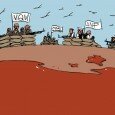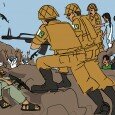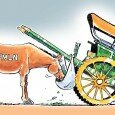Negotiations with militants
Prime Minister Nawaz Sharif seems to have preference for negotiations over use of force while dealing with the issue of militancy and terrorism. Recent statements by government officials and the decision to stay executions of militants reek of appeasement and raise fears that Nawaz government is not willing to take the specter of militancy and terrorism head on. On his part, Mr. Sharif feels that the use of force will unleash suicide bombings and once again drag the country into a vortex of violence. “Being the Prime Minister, every Pakistani is my kith and kin. I can not shoulder the funerals of my sons every day,” he said in a somber tone during his first policy speech to the nation.
Mr. Sharif also feels, and rightly so, that the country’s sinking economy can only be turned around if he is not encumbered by a situation where law and order spirals totally out of control. It might be a pragmatic approach but risks emboldening the militants even more. Government officials say that there is a need to develop a national consensus before evolving a national security policy. It is easier said than done, given the deep, entrenched divisions and ideological positions in the national polity. The delay in holding an all political parties conference indicates existing fissures. Instead of dithering and obfuscation, the government needs to come out with its own clear and coherent policy and assert itself. The militants have also exhibited signs of rifts within themselves over the issue of talks with the government. Taliban hurriedly sacked their Punjab spokesman in late August after he made a conciliatory statement towards the government’s offer of peace talks. The differences within the militants portend a precarious future as they are refusing to lay down their weapons. In a situation where both sides lack seriousness towards peace talks, violence dangerously lurks around the corner. Militants, with their expansionist ambitions and literal interpretations of religion, will not just confine themselves to the tribal badlands and will continue to pose an existential threat to the rest of the country.
Some of the recent steps by the government –re-establishing of the National Security Council and plans to form a new Joint Intelligence Directorate–have also come under criticism. The real need is to make already existing structures and institutions functional and operative, instead of opting for newer ones or playing with nomenclature.































































































